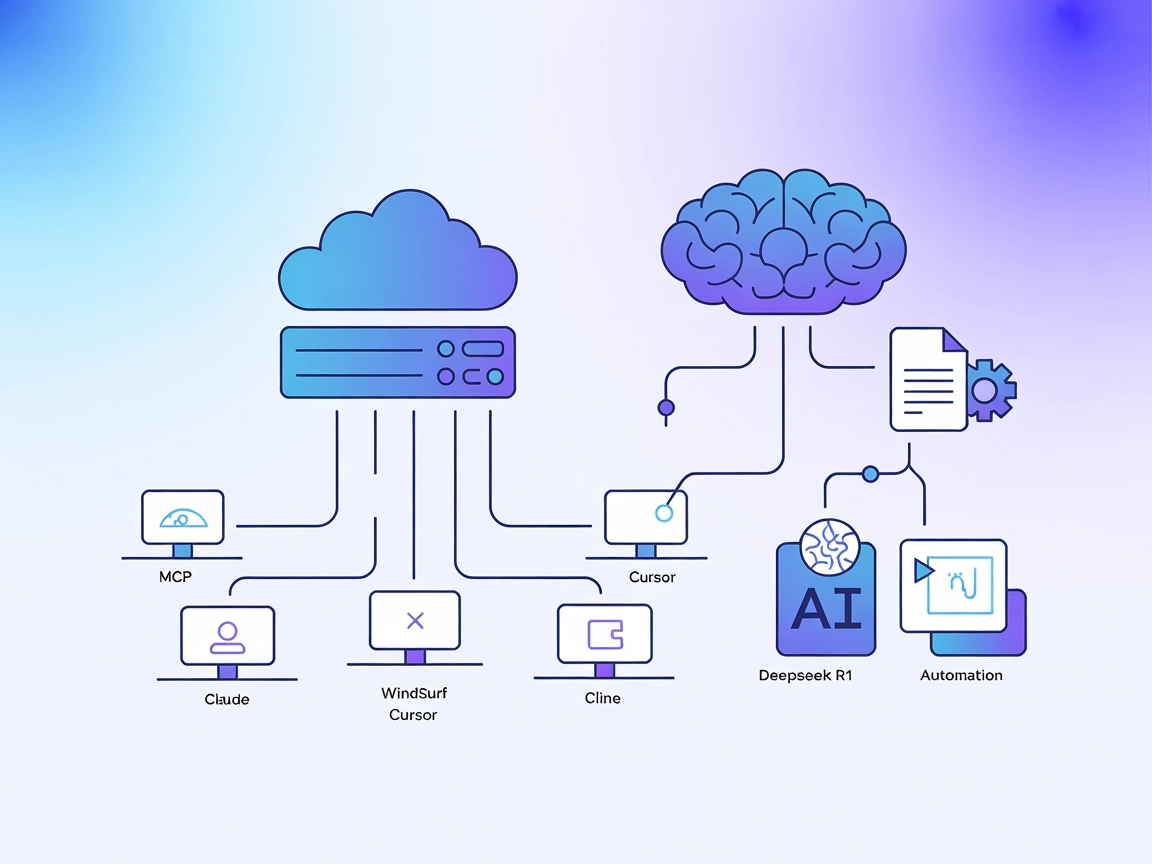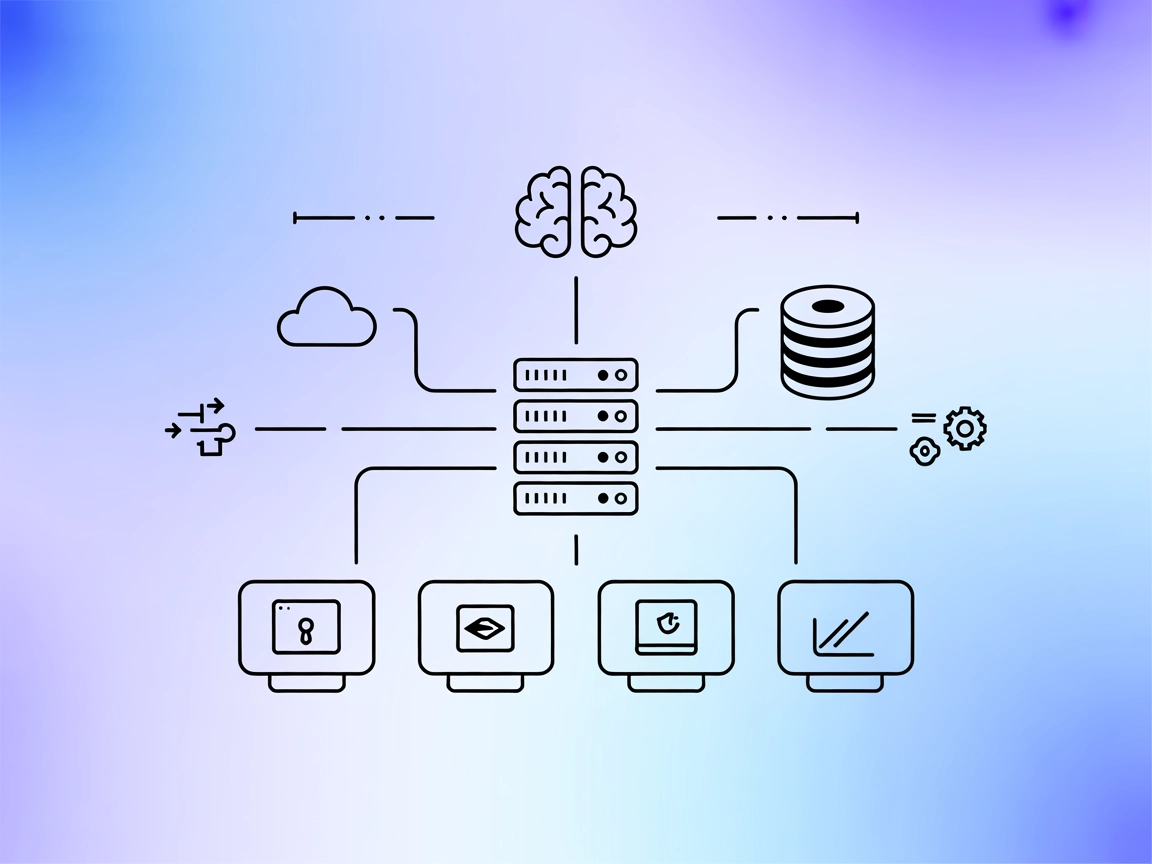
DeepSeek MCP Server
The DeepSeek MCP Server integrates DeepSeek's advanced language models with MCP-compatible applications, providing secure, anonymized API access and enabling sc...

Bridge DeepSeek’s powerful language models with your favorite MCP-compatible clients via a secure, anonymous proxy server for seamless AI integration and workflow automation.
FlowHunt provides an additional security layer between your internal systems and AI tools, giving you granular control over which tools are accessible from your MCP servers. MCP servers hosted in our infrastructure can be seamlessly integrated with FlowHunt's chatbot as well as popular AI platforms like ChatGPT, Claude, and various AI editors.
The DeepSeek MCP Server is a Model Context Protocol (MCP) server designed to bridge DeepSeek’s advanced language models with MCP-compatible applications such as Claude Desktop. By acting as a proxy, it enables AI assistants to interact with the DeepSeek API while maintaining user anonymity—only the proxy is visible to the API. This integration facilitates enhanced workflows for developers by allowing seamless access to DeepSeek’s powerful natural language capabilities. Through the MCP server, applications and AI agents can leverage DeepSeek models for tasks like language understanding, text generation, and API-driven automation, all within a standardized, secure, and extendable protocol framework.
No prompt templates were mentioned in the repository or its documentation.
No explicit MCP resources were described in the repository or its documentation.
No tool definitions (e.g., query_database, read_write_file, call_api) were found in the available files or README.
windsurf.config.json)."mcpServers": {
"deepseek-mcp": {
"command": "npx",
"args": ["deepseek-mcp-server", "start"]
}
}
"mcpServers": {
"deepseek-mcp": {
"command": "npx",
"args": ["deepseek-mcp-server", "start"]
}
}
cursor.config.json."mcpServers": {
"deepseek-mcp": {
"command": "npx",
"args": ["deepseek-mcp-server", "start"]
}
}
cline.config.json file."mcpServers": {
"deepseek-mcp": {
"command": "npx",
"args": ["deepseek-mcp-server", "start"]
}
}
Use environment variables for sensitive configuration (like API keys). Example:
"mcpServers": {
"deepseek-mcp": {
"command": "npx",
"args": ["deepseek-mcp-server", "start"],
"env": {
"DEEPSEEK_API_KEY": "${DEEPSEEK_API_KEY}"
},
"inputs": {
"api_key": "${DEEPSEEK_API_KEY}"
}
}
}
Using MCP in FlowHunt
To integrate MCP servers into your FlowHunt workflow, start by adding the MCP component to your flow and connecting it to your AI agent:

Click on the MCP component to open the configuration panel. In the system MCP configuration section, insert your MCP server details using this JSON format:
{
"deepseek-mcp": {
"transport": "streamable_http",
"url": "https://yourmcpserver.example/pathtothemcp/url"
}
}
Once configured, the AI agent is now able to use this MCP as a tool with access to all its functions and capabilities. Remember to change “deepseek-mcp” to whatever the actual name of your MCP server is and replace the URL with your own MCP server URL.
| Section | Availability | Details/Notes |
|---|---|---|
| Overview | ✅ | Found in README.md |
| List of Prompts | ⛔ | No prompt templates found |
| List of Resources | ⛔ | No explicit resources listed |
| List of Tools | ⛔ | No tools defined in server files |
| Securing API Keys | ✅ | .env.example exists, instructions provided |
| Sampling Support (less important in evaluation) | ⛔ | Not mentioned |
Roots support: Not mentioned
Sampling support: Not mentioned
Based on the above, the DeepSeek MCP Server is primarily a proxy adapter for the DeepSeek API, providing good documentation for setup and secure key management but lacking explicit examples of prompts, resources, or tools. It is best suited for users who want easy, anonymous access to DeepSeek models in MCP-compatible environments.
This MCP server is well-documented for setup and security but lacks detailed examples of advanced MCP primitives (like prompts, resources, tools). Its main value is enabling easy access to DeepSeek models. The project appears active and is well-received by the community.
| Has a LICENSE | ✅ (MIT) |
|---|---|
| Has at least one tool | ⛔ |
| Number of Forks | 32 |
| Number of Stars | 242 |
The DeepSeek MCP Server is a proxy that connects DeepSeek’s language models to MCP-compatible clients like FlowHunt or Claude Desktop. It allows applications and agents to use DeepSeek models for language tasks while keeping your API key and identity hidden from third-party services.
By acting as a secure proxy, DeepSeek MCP Server ensures your API key and user identity are never exposed to the DeepSeek API, providing privacy and centralized access management.
You can use the DeepSeek MCP Server for anonymous model access, integrating DeepSeek with desktop clients, managing API usage centrally, automating workflows, and rapid prototyping of AI-powered features.
It is recommended to use environment variables to store your DeepSeek API key. The MCP server reads the key from your environment configuration, ensuring sensitive data isn’t exposed in plain text.
No explicit prompt templates or tool definitions are provided. The server functions primarily as a proxy, enabling basic model usage within MCP-compatible environments.
Integrate DeepSeek models into your MCP workflows securely and effortlessly. Start using advanced language models in your projects today.

The DeepSeek MCP Server integrates DeepSeek's advanced language models with MCP-compatible applications, providing secure, anonymized API access and enabling sc...

The Deepseek R1 MCP Server enables seamless integration of DeepSeek’s advanced language models, such as Deepseek R1 and V3, into Claude Desktop and other suppor...

Deepseek Thinker MCP Server integrates Deepseek model reasoning into MCP-enabled AI clients like Claude Desktop, providing advanced chain-of-thought outputs for...
Cookie Consent
We use cookies to enhance your browsing experience and analyze our traffic. See our privacy policy.